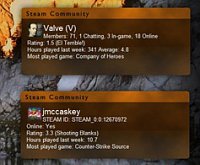Steam Community Beta impressions

Are the trio of characters a cheeky dig at Xbox Live, or just the most effective tool for the job? Perhaps a bit of both.
If you read this site you’ve probably been using the Steam Community for longer than me, so I’m assuming prior knowledge of what it is and does for this post. If you’ve not used it yet, you’ll find it easier to get the beta, join a few groups (if you can find them) and add some non-Steam games before continuing. We’re going to talk about why the Community is on track not only to succeed but to surge past both GFWL and the GameSpy/Xfire models and become the most successful network of its kind, and I don’t want anyone left behind.
Thirteen million reasons
The Steam Community will succeed because of Steam’s popularity, as already established with Counter-Strike, Half-Life 2, and the snowballing library expansion since. Unlike the untethered Xfire-like solutions of the past, joining groups, browsing the network, using voice chat, using group chat and tracking events will be immediately availability to thirteen million active players. There’s no need to entice a single one of them to sign up or install additional software, or have them worry about whether their friends will ever make it to the same network. The Community “just works”.
Only creating a public profile or a group requires input beyond clicking a confirmation box, and most of usual stumbling blocks are passed over when creating a Steam account itself. In fact when someone is already using the immediately available Community features, I’d go so far as to call it completely certain that unless the person actively prefers anonymity they settle into a SteamID before long. Which makes them accessible to others, which makes the network more valuable and more of a success. Which moves us on…
Non-Steam games
The Community stands to dominate because any game that uses OpenGL or DirectX can benefit from it every bit as much as those distributed natively. Adding this to the immense user base leaves no doubt in my mind that Steam’s network will very quickly if not immediately reach the critical mass needed to become a very large part of the PC’s answer to Xbox Live’s “Plug and Play” gaming. It’s the second killer advantage — the one that GFWL’s built-in and non-resident technology does not have.
Who’s going to pay for voice in Halo 2 now?
Non-Steam support is good for everybody. Without lifting a finger developers suddenly receive a robust and popular community system, which is likely to already be in use by the majority if not all of their players and is accessible to the rest for free. They can schedule tournaments and other promotional events almost as easily, and quite possibly without having to pay through the nose for the privilege. It’s good for players for the same reasons; particularly purveyors of older multiplayer games who currently rely on untethered and typically obscure fansites to schedule matches. If the game has an existing release on Steam, all the better for both groups!
Valve gain on three fronts: non-Steam advertises the platform to developers, their potential clients, advertises it to unconverted players, their potential customers, and edges Microsoft one step further out of the picture with every conversion, especially if it’s a GFWL title being played. Who’s going to pay for voice in Halo 2 now a service almost exactly as useful is free after a few clicks?
The Achilles’ heel is that all of this depends on awareness. The entire non-Steam system is currently hidden behind a single low-key menu item, and will completely fail to amount to any of the things I’ve described if it stays there. Interface tweaks are short term answers, but they are only relevant to existing users: if Valve really want to see the Community succeed as it deserves to, I don’t think it will take anything less than a full non-Steam advertising campaign.
Issues and downsides
The Community has one major downside: it introduces the concept of logging into your Steam account through a browser. You’d only want to login to the site when you were away from a Steam installation, so at least people will detect something unusual when they’re asked to login manually, but it remains an undeniable step down in terms of phishing security that will inevitably be exploited by criminals across the world. With 256-bit page encryption, at least direct hacking isn’t an issue.
Internet Explorer simply cannot cope
Continuing on the subject of web pages, Steam continues to use Internet Explorer, which perhaps because of its position within a VGUI window simply cannot cope with the complexity of the Community’s busier pages. Massive slowdown even on the desktop, scrolling bugs and agonisingly slow loading plague embedded pages. How long until we get a stripped-back Gecko renderer, Valve?
The beta also pushes Steam’s memory and CPU usage up considerably, to 10-11MB and a constant 5-10% of my (1.66GHz Core2) processor time when idling with all windows closed, which is up from around 3MB and no CPU at all. Hopefully this will be ironed out before the beta ends, but the extra load the Community adds to the client is something to keep a close eye on regardless.
Missing pieces
Despite appearances, the Community’s infrastructure is barely present in this beta. Group and User pages exist in isolated islands with no system of navigation except bouncing from user to user to group — hardly helpful for newcomers without any contacts. The search function placeholder is visible, but central game pages and a navigable homepage, both utterly essential items, have yet to be hooked up at all.
Given the rampant forum anticipation for the beta’s release Valve’s decision to launch ASAP is understandable, but I can’t help but wonder what impact this state of isolation will have on the beta users and their understanding of the system if it goes on too long; early adopters are usually the opinion-formers, after all.
Game integrations (including achievements, matchmaking and in-game avatar/group display) have yet to appear in any form either, but fret not: they are coming, and large swathes of the API are likely to be open to modders when they do.
Of the features that aren’t known to be in development, wider Server Browser support is easily the most desirable. There is some movement on this front, as Red Orchestra‘s master server now reports to Friends the server a player is connected to (even if the Steam client doesn’t know how to ping it!), but the problem will need a different approach to be more widely applicable. If Valve publish a “Steam protocol”, the Community’s influence may be enough to prompt developers to add support to their master servers of their own accord. Or perhaps the client could simply be engineered to to ping the master and game servers itself, though this would probably increase overhead considerably. The best answer is most likely to be a mix of the two.
Finally, a Gamercard-equivalent for redistributing Community data isn’t provided. The (lowercase) community have stepped in however, with signature images and Vista, Mac OS X and Google gadgets, among other tools.
A Group is it’s Own Worst Enemy
Today’s issues with the Community are the sort of technical problems you can only expect from unfinished software, but tomorrow’s will be something else entirely; Clay Shirky’s 2003 social software keynote gives an excellent and timeless overview of the management issues surrounding large communities. Whether it applies to the Community will depend on how well the currently absent browsing and discovery infrastructure works, and whether or not the community sees fit to take their network beyond games, but if it does Valve will have a whole new challenge on their hands. We can only hope they will rise to meet it.




14 Responses to this post:
Comments
ReBoot Says:
A good review.
However, you make two mistake.
a) the Gecko engine is even not as fast Trident, if you want a fast engine, don’t ask for Gecko. Stay with Trident or ask for Opera. But you’re not the only one with the mistake, alot of people beliefe that FF is better than IE without really knowing.
b) the review mentions alot of flaws about the community not mentioning that it’s a beta. Especially ressource usage is known to be high in betas and go down in RTMs.
Andy Simpson Says:
Ah, the Steam Review. Hardly ever prompt with breaking news, but somehow always a lot more worth reading 🙂
Anyhoo, even if a Steam protocol is freely released, I can’t see most developers adopting it for their own games. It just doesn’t to me seem likely – touching code is risky, and needs developer time. This is a cost which most developers are probably not going to bear.
The solution to me seems to be to leverage the community. Already steamextras.com has stepped in and filled in some gaps in the Community’s service, the logical step to me seems to me that Valve provide an API which would let the community build components which could retrieve server lists from master servers and game information from servers.
Full Red Orchestra support would probably be ready in about a couple of hours! It’s based on Unreal, so I imagine how to do that kind of server querying is already very well understood.
Then as these components become popular, just list them up on the Steam website somewhere, similar to how they list mods today.
Personally I’m becoming pretty interested in the potential of community, as long as they’re given the tools to do something worthwhile. Just with html scraping the data steamextras has done a good job, with a robust API, who knows what could be possible. Or the potential of… wikification, for the lack of a better word. The utilisation of large groups of people to generate good content / make good decisions.
Tom Edwards Says:
[quote comment=”3420″]the Gecko engine is even not as fast Trident, if you want a fast engine, don’t ask for Gecko. Stay with Trident or ask for Opera. But you’re not the only one with the mistake, alot of people beliefe that FF is better than IE without really knowing.[/quote]
However, it is open source. 🙂 Valve can’t modify Trident’s code to better work in VGUI, or strip out Opera’s unneeded components.
[quote comment=”3421″]Anyhoo, even if a Steam protocol is freely released, I can’t see most developers adopting it for their own games. It just doesn’t to me seem likely – touching code is risky, and needs developer time. This is a cost which most developers are probably not going to bear.[/quote]
Even on code that doesn’t ship? I’d have thought that 95% of the hard work would have been done building the servers in the first place too. The Source protocol doesn’t look particularly tricky to me.
On top of that, if things go very well for Valve a dev could end up simply wanting to use it as their default format! 😛
Andy Simpson Says:
[quote comment=”3422″]
However, it is open source. 🙂 Valve can’t modify Trident’s code to better work in VGUI, or strip out Opera’s unneeded components.
[/quote]
This is true, and it’s an LGPL license, so there’s no legal issues.
[quote comment=”3422″]
Even on code that doesn’t ship? I’d have thought that 95% of the hard work would have been done building the servers in the first place too. The Source protocol doesn’t look particularly tricky to me.
On top of that, if things go very well for Valve a dev could end up simply wanting to use it as their default format! :-P[/quote] In a way it does ship, as the new code has to be rolled out onto their already deployed servers. Sure, it only has to interact with the old code in a very read-only fashion as it simply has to grab the list of servers and output them in a different way, but it’s still as risk, just as adding any new code is a risk. And it’s a risk without much of a reward.
The Source protocol is pretty simple, I’ve written C# clients for it myself. And the documentation is better than it was, thanks to the wiki.
Not sure if I’d use it myself for a game, though. Not in the state it is now. I mean, it has the advantage of being pretty efficient and all, but… it’s not an open format. It’s not really designed for any kind of general-purpose use. I guess, since server rules allows arbitrary key-value pairs, you can stuff custom data in there.
Looking at the documentation, almost every game supported by the Steam server browser is using a slightly different return format.
ATimson Says:
[quote comment=”3420″]a) the Gecko engine is even not as fast Trident, if you want a fast engine, don’t ask for Gecko. Stay with Trident or ask for Opera.[/quote]
Or Webkit. 🙂
HOLOGRAPHICpizza Says:
Webkit is cool, but it is very macy, and might require some ripping/tearing/cramming to untether it from the mac world. i really like Gecko, since it is completely open source, valve could customize it to fit perfectly within their interface.
ATimson Says:
[quote comment=”3439″]Webkit is cool, but it is very macy, and might require some ripping/tearing/cramming to untether it from the mac world. i really like Gecko, since it is completely open source, valve could customize it to fit perfectly within their interface.[/quote]
Webkit is also open source; the code is buildable out-of-the-box on Windows, and I believe on Linux, in addition to Mac OS X. 🙂
ironclad Says:
I, for one, couldn’t agree more with the sentiment that IE isn’t necessary or efficient with Steam. It still has options like ‘export to Microsoft excel’! Not only is the Steam Community web interface suffering (I have encountered many glitches with graphics as well), but the overall speed and functionality seem to bog steam down. Why hasn’t there been the switch, is it not realistic for them to change the web tool?
Tomer Says:
They hear you! 🙂
http://developer.valvesoftware.com/wiki/The_Steam_Community
Um No Says:
[quote comment=”3420″]A good review.
However, you make two mistake.
a) the Gecko engine is even not as fast Trident,[/quote]
This is, of course FUD, and inaccurate FUD at that.
4 Trackbacks/Pings
Steam Community Beta impressions - Facepunch Studios
Steam P2P Files - Halflife2.net
Facepunch Archives: Steam Community Beta impressions - Page 1
The Steamcloud conference - The Steam Review